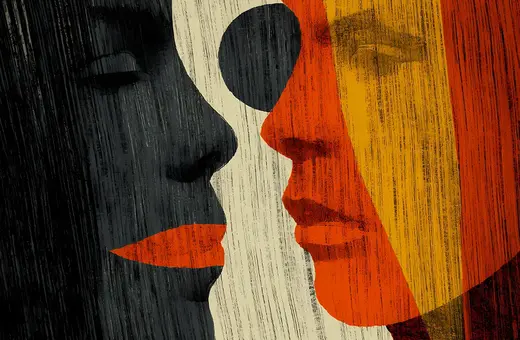“Received wisdom” is a kind of cultural white noise: it comes at us all the time, and we mostly tune it out. It comes at us from TV, radio, Twitter, news, fake news, family, friends, fake friends, colleagues. A continuous feed of messages we’ve heard so often we don’t even hear them any more.
Left unchallenged, they become foundation notes for our lives. The effects of this can be incredibly intimate. These days, I only wear underwear from the company that advertises on all my favourite podcasts. Our closest relationships are at least as intimate as our underwear, and they can be influenced in the same way.
I work on isolating and questioning implicit signals about love and romance buried in the white noise. Let’s tune in for a moment and make a few of these messages explicit. First message: love (especially romantic love) is the best thing there is. Second message: it’s something money can’t buy. Third message: it’s what a truly good person wants out of life (as opposed to wealth, power, fame, success, power, etc.).
We also get pretty specific information on how love (and, by extension, a good and happy life) will happen. From earliest childhood, we are taught that our “happy ever after” will come when we are struck with passion for “the one.” Women, especially, are taught to be passive about this: some day our prince will come. That will be the end of our story: happiness forever.
Of course we know this is a myth. But simply knowing that doesn’t lift the weight of expectation it creates. The myth is operative in your social world, impacting your interactions with others. It’s likely also shaping your own subconscious desires, below the level of awareness, evading the watchful eye of your cynical mind.
The myth functions by setting a baseline for how love and life “should” go: a set of romantic norms to determine what is “normal.” And once that is established then everything else, however much it might be tolerated, is not going to be normal. Everything else is in the margins.
___
"What if I don’t have a prince? What if I don’t want one? Am I a bad person for caring about someone or something else instead? If money doesn’t buy love why is dating so expensive? Can I be happy without being in love? Is happiness the point of being alive?"
___
The margins are full of questions. What if my prince never comes? What if I don’t have a prince? What if I don’t want one? Am I a bad person for caring about someone or something else instead? If money doesn’t buy love why is dating so expensive? What if I’m unloveable? Can I be happy without being in love? Is happiness the point of being alive?
Being bombarded with difficult questions tends to make people anxious. Easy answers and simple stories are calming.
The simplest romantic story goes like this: a man pursues and eventually “wins” (eww) a woman. First comes love, then comes marriage, then comes baby in a baby carriage (cared for primarily by the woman while the man “provides” for his family). They live happily ever after. We worship this iconic story over and over, in everything from folk tales to rom coms to advertisements for kitchen appliances. Constant attempts to mimic the story play out—with varying degrees of success—in people’s real lives.





















Join the conversation